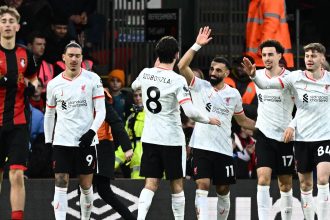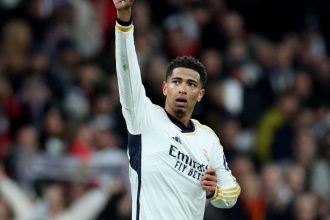Boyd Rankin forsook a potential rugby career for his first love, cricket
Dileep Premachandran12-Apr-2007
Vital scalp: Boyd Rankin gets Michael Vaughan © Getty Images
In March, when the star-studded rugby team came agonisingly closeto Ireland’s first Six Nations Championship since 1985, it was a strappingcricketer that won the BBC Radio Foyle/Bank of Ireland Sports Personalityof the Month award. Barely known a few days earlier, Boyd Rankin’s heroicspushed the cricket team on to the back pages and the rugby heroes inside,yet he would be the first to tell you that it could all have been so verydifferent.Right through his secondary education at Strabane Grammar School, Rankinplayed No.8 for the rugby team. A pivotal position occupied by legendslike Mervyn Davies (Wales) and Morne du Plessis (South Africa), it’sevolved in recent times to such an extent that the man in possession ofthe jersey needs the ball-skills of a back and the brute strength of aforward. At 6’8″, Rankin certainly wasn’t lacking in strength, but therewas something else holding him back.That was a love of cricket. In Michael Ondaatje’s , it was eccentricity that was the common thread. For theRankins, it’s cricket. “Dad still plays, though each season he says it’llbe the last,” says Boyd with a goofy grin. “He’s 57 now. My brothers bothplayed for the Under-19s as well. Robert (21) played with me in Bangladeshin 2004, and David (19) played in Sri Lanka last year. My sister’s only16, but she’s represented the region as well.”Yes, it’s in the back of your mind that it’s not a big sport [in Ireland]in the way that football or rugby is. But it’s not about being famous;it’s about what you’re good at.”His first foray on to the world stage was a big letdown. Little went rightfor him in Bangladesh and in his three outings, he had 2 for 104 at awhopping economy rate of 7.25. That wasn’t going to discourage him though,or extinguish a dream that had started burning bright when he was inprimary school. “We obviously didn’t have much cricket in Ireland, but Iwatched a lot on TV. I modelled myself on Curtly Ambrose and GlennMcGrath, bowlers who hit the deck from just back of a length outside offstump.”By 15, he was playing for the first team at Bready, the local club, and hewent on to represent Ireland at every age group from U-13 onwards. Infact, his Irish debut came even before the trip to Bangladesh. “It wasagainst a team called the Free Foresters,” he tells you. “We didn’t playtoo many international teams back then.”That game at Eton College also saw the advent of one of Irish cricket’sbiggest hopes. A precocious 16-year-old named Eoin Morgan made his debutthat day, but for all the talk of him being an England prospect one day,it’s been Rankin that’s caught the imagination at the World Cup.Though he wasn’t called up for the national side in 2004 or 2005, therewere enough outings with the U-19s and the A team to attract the attentionof county scouts. There were several offers of trials, but when it came tothe crunch, Rankin chose Middlesex. The reason was a simple one. “It wasbecause of the Irish connection, with Ed Joyce and Morgan there,” he says.”I wanted to be some place where I knew a few faces.”He had a summer contract with Middlesex in 2004 and ’05, but though he didfairly well for the second XIs, the call-up to the county side never came.When the winter of 2005 came along, it was clear that Rankin needed tomake some tough choices.That was when he came across an individual he had first met two yearsearlier in Spain, at the European Cricket Academy arranged to help youngtalent from countries like Ireland, Scotland, the Netherlands and Denmark.Mike Hendrick had played 30 Tests and 22 one-day internationals forEngland, and was employed as Derbyshire’s bowling coach when he invitedRankin over for a couple of training sessions.The time was right for a change. “In my time at Middlesex, I didn’t reallyprove anything,” says Rankin. “They were also trying to change my action.Two or three different coaches were giving me tips, and it messed me up abit. I came across Hendo again when I was at University, studyingagriculture at Harper Adams College in Shropshire.”After that, things should have fallen into place, but they didn’t. Therewas a game for Derbyshire’s first XI and a Pro40 match against Kent wherehe took a wicket in his first over, but a side strain subsequently endedhis season. The road back included another stint with Ireland A, before acouple of matches at the European Championships in Glasgow. When the WorldCup squad was announced in August, he was in. We’re sitting on the steps of the Garfield Sobers Pavilion at theKensington Oval, and Rankin stares quietly at the sun-baked strip in themiddle as the practice session winds up. It’s always been my dream toplay against Australia, he says quietly. To do it in a World Cup is justunbelievable. Talking to McGrath after the game would make it evenbetter. From October, he trained full time with the Northern Ireland SportsCouncil, and then went to South Africa in January for more fitnesstraining. “I did reasonably well in games against teams like EasternProvince,” he says, “but didn’t feature much in the World Cricket League[in Kenya]. I had one match, but didn’t do nothing. I was down with astomach bug.”He was steady rather than spectacular in the two warm-up games againstSouth Africa and Canada – one wicket to Dave Langford-Smith’s eight – butcame into his own in the St Patrick’s Day clash against Pakistan,dismissing Younis Khan, Kamran Akmal and Azhar Mahmood. On a day when therugby team had to endure Six Nations heartbreak, the cricketers scriptedtheir bit of folklore with a stunning three-wicket triumph.Following that, there were messages of support from Eddie O’Sullivan, thecoach, and the rest of the rugby team, and also from Roy Keane, theManchester United legend now coaching at Sunderland. There was also goodadvice from Courtney Walsh, an icon in Jamaica and once the world’shighest wicket-taker. “His advice was that it’s basically a simple game,”says Rankin. “Just do the basics well, and try not to overcomplicatethings.”That accent on the uncomplicated also came from Jeremy Snape, the formerEngland offspinner who worked briefly with the Irish in his role as sportspsychologist. “I used to have a lot of negative thoughts at the top of myrun-up,” says Rankin. “I’d think of wides and no-balls, and of being hit.He taught me to get over that, and also block out the crowd.”We’re sitting on the steps of the Garfield Sobers Pavilion at theKensington Oval, and Rankin stares quietly at the sun-baked strip in themiddle as the practice session winds up. “It’s always been my dream toplay against Australia,” he says quietly. “To do it in a World Cup is justunbelievable. Talking to McGrath after the game would make it evenbetter.”






